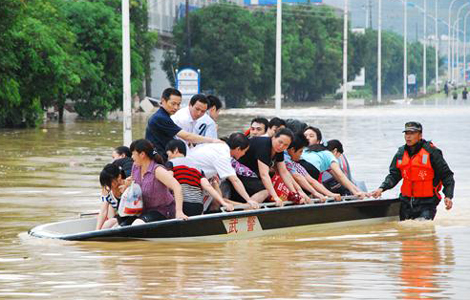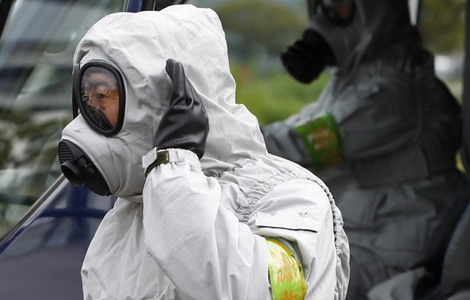China wages war against poverty
Updated: 2011-09-02 15:55
(Xinhua)
|
|||||||||||
LANZHOU - Even in the golden season of autumn, Gongjing, a small town in northwest China's Gansu Province, is a grim place with bleak hopes for this year's harvest. The arid, barren farmlands in the region's mountainous areas have prevented even the most drought-resistant crops from growing.
"It's very likely that this will be another year with almost no harvest, after about 10 consecutive years of severe droughts," said Liu Yinzu, an official from Gongjing's village of Zuodi. "Farmers can barely reap anything more than the amount they have sowed."
Gongjing is located in northern Yuzhong county, where mountainous terrain, a lack of transportation infrastructure and dry weather have essentially stranded the town. Many of its residents, as well as people living in five neighboring towns, have lived in poverty for years.
However, provincial authorities are bearing down on alleviating poverty in these areas to provide a better life for their residents.
Poverty alleviation efforts
Gansu, one of the country's poorest provinces, was also one of the first provinces to directly engage in poverty alleviation efforts. Over the past 20 years, the amount of people living in poverty in the region has been reduced by 60 percent.
However, as of the end of last year, the province still had about 3.09 million people in its five least developed areas living under the poverty line. This means they each earn only 1,196 yuan ($187) annually, according to the country's 2009 poverty standard.
Nonetheless, poverty relief in Gansu has entered a new stage that is markedly different from the practices that were put in place in the past, according to Shabaicili, the head of Gansu's development and poverty alleviation office.
Poverty relief work in the region has changed from solving subsistence problems to making efforts to increase local residents' incomes, he said.
Zhang Wenqi, a 80-year-old man from Zuodi, lives with his wife, daughter-in-law and his grandson in a cave dwelling, where the walls are pasted with newspapers that date back to 1986.
Zhang and the family used to live on his second son's meager income. However, the death of the son, the main laborer of the family, 20 years ago delivered a heavy blow to the household.
Although Zhang is still doing some farm work in his 80s, he has not been able to raise a decent harvest, due to adverse natural conditions.
Fortunately, the government is providing a monthly basic living allowance of 65 yuan per capita to Zhang and his family. Zhang and his wife also receive monthly pension subsidies of 55 yuan each.
"Thanks to the government's allowances, we can at least manage to feed ourselves. The current problem is how to improve our living conditions," Zhang said.
Improving living standards
The problem Zhang's family faces is quite common in northern Yuzhong, said Qi Aihong, a Gongjing government official.
"The town does not have many developed industries, so we are considering trying to boost the local economy by encouraging residents to grow Chinese medicinal herbs," Qi said.
Previous relief efforts included the launch of several policies between 2008 and 2010 that were designed to provide subsidies to people living in the county's least-developed areas. Under these policies, the government provides loans to local residents to encourage them to pursue trades that are suited to the region's environment, such as potato farming, sheep breeding and growing medicinal herbs.
The province has also targeted younger people living in poverty by providing them with vocational training. Over the past five years, about 113,000 young people from poor families have received the training; 95 percent of them went on to find jobs in China's bigger cities.
Local villages are also receiving funds from the provincial government to improve infrastructure and educational facilities.
However, poverty alleviation officials are now calling for more public awareness and participation regarding the issue.
"All government departments and society members should be mobilized to do their share in reducing poverty," said Shabaicili.
Hot Topics
Libya conflict, Gaddafi, Oil spill, Palace Museum scandal, Inflation, Japan's new PM, Trapped miners, Mooncake tax, Weekly photos, Hurricane Irene
Editor's Picks

|

|

|

|

|

|







